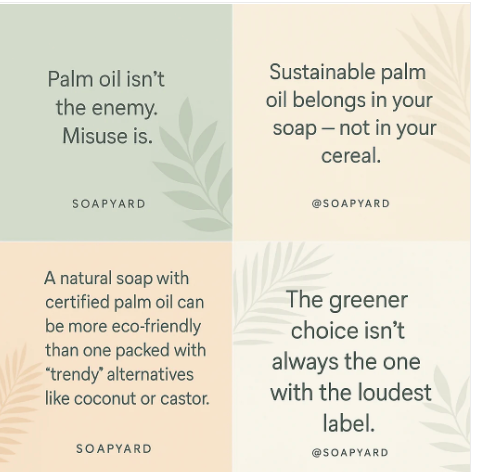
Why Sustainable Palm Oil Belongs in Soap - and Not in Your Breakfast
Share
The conversation around palm oil is often heated — and understandably so. Linked with deforestation, habitat loss, and corporate greed, it has become something of a villain in the public eye. But like many complex topics, the truth is more nuanced than a boycott list or a ‘free-from’ label. When it comes to food and cosmetics, palm oil needs to be looked at differently. And when it comes to traditional soap, especially the kind crafted from age-old recipes in places like Provence or Marseille, sustainable palm oil remains not just acceptable — but essential.
A Quick Look at the Landscape
Palm oil is derived from the fruit of the Elaeis guineensis tree, a plant native to West Africa but now grown largely in Indonesia and Malaysia. It is used in an astonishing range of products — from crisps to shampoo, lipstick to laundry detergent. The global demand has skyrocketed since the 20th century, especially as food manufacturers prized its low cost, long shelf life, and neutral taste.
But herein lies the issue: overconsumption. The sheer scale of palm oil in ultra-processed food and industrial cooking oils has led to vast deforestation, peatland draining, and monoculture farming that threatens biodiversity in tropical ecosystems. The orangutan has become an emblem of this crisis — an animal pushed to the brink by habitat loss.
Yet to lump every use of palm oil under this banner misses the finer point: the problem isn’t palm oil itself, but how — and where — it's used.
Palm Oil in Soap: A Historical and Sustainable Choice
Palm oil has a long, legitimate history in traditional soap-making. Long before it became a fixture in supermarket pastries, it was prized by artisan soap makers for its mildness, lathering ability, and ability to create a firm, long-lasting bar. Combined with olive oil and coconut oil, it forms the backbone of many classic soap recipes, including Marseille soap — a product with centuries of history and no unnecessary additives.
Unlike food, which uses palm oil in huge quantities as cheap filler, natural soap requires relatively little. What’s more, when sourced from certified sustainable plantations — such as those under RSPO (Roundtable on Sustainable Palm Oil) — the environmental footprint of palm oil is surprisingly low. In fact, palm oil yields more oil per hectare than any other oil crop. It’s about 4 to 10 times more land-efficient than alternatives like soybean or sunflower. Switching to trendy alternatives like coconut or castor (ricin) oil isn’t always the greener move — despite what marketing might imply.
The Greenwashing Trap
In recent years, coconut, shea, castor, and even almond oil have been heralded as ‘clean’ or more ethical options. But few consumers realise that coconut farming also comes with issues — biodiversity loss, worker exploitation, and lower yields that demand more land per litre. Castor oil, often seen in "green" formulas, requires large amounts of water to cultivate. Shea butter is mostly hand-processed by women’s cooperatives in West Africa — which can be a good thing — but demand surges have led to deforestation and labour pressure.
The greenwashing of oil alternatives is a worrying trend — one that risks pushing farmers from one unsustainable crop to another under the banner of "natural."
A Better Way Forward
Instead of demonising one oil and glorifying others, we need to look at the system. What matters is:
- Where the oil comes from
- How it's grown
- Who benefits from its production
- What it's being used for
Using certified sustainable palm oil in natural, minimally processed products like soap is a rational, ethical choice — particularly when the alternative might be greater land use and transport emissions from imported "clean" oils with smaller yields.
The Stats You Should Know
- Palm oil produces 35% of the world’s vegetable oil on just 10% of the land used for oil crop
- Soy, coconut, and rapeseed require 4–10x more land than palm to produce the same amount of oil
- The RSPO now certifies around 20% of the global supply as sustainable (source)
So What Should You Do?
Rather than reject palm oil outright, look for transparency. Check if the product specifies sustainably sourced palm oil. Traditional soaps from smaller producers — particularly in Europe — often use RSPO-certified palm oil as part of a balanced, traditional base. That’s a far cry from the 40-ingredient supermarket ready meal.
Avoiding palm oil in ultra-processed food? Sensible. Rejecting it in soap? Not always
"Palm oil isn’t the enemy. Misuse is."
Used responsibly in traditional soap, sustainably sourced palm oil is more land-efficient than any other oil crop.
"A natural soap with certified palm oil can be more eco-friendly than one packed with 'trendy' alternatives like coconut or castor."
Don’t let greenwashing cloud the facts
"Soapmakers have used palm oil for centuries — not because it’s cheap, but because it works."
Lathers well. Lasts long. Kinder to land.
"Palm oil yields more oil per hectare than any other vegetable oil."
Less land. More efficiency. Fewer emissions.
"Sustainable palm oil belongs in your soap but not in your cereal."
Food use drives overconsumption. Traditional soapmaking does not.
"The greener choice isn’t always the one with the loudest label."
Understand the story behind your soap.
"If you care about deforestation, don’t just boycott — buy better."
Support RSPO-certified palm oil and artisan soapmakers who use it responsibly.
Further Reading and Resources:
Roundtable on Sustainable Palm Oil (RSPO)
